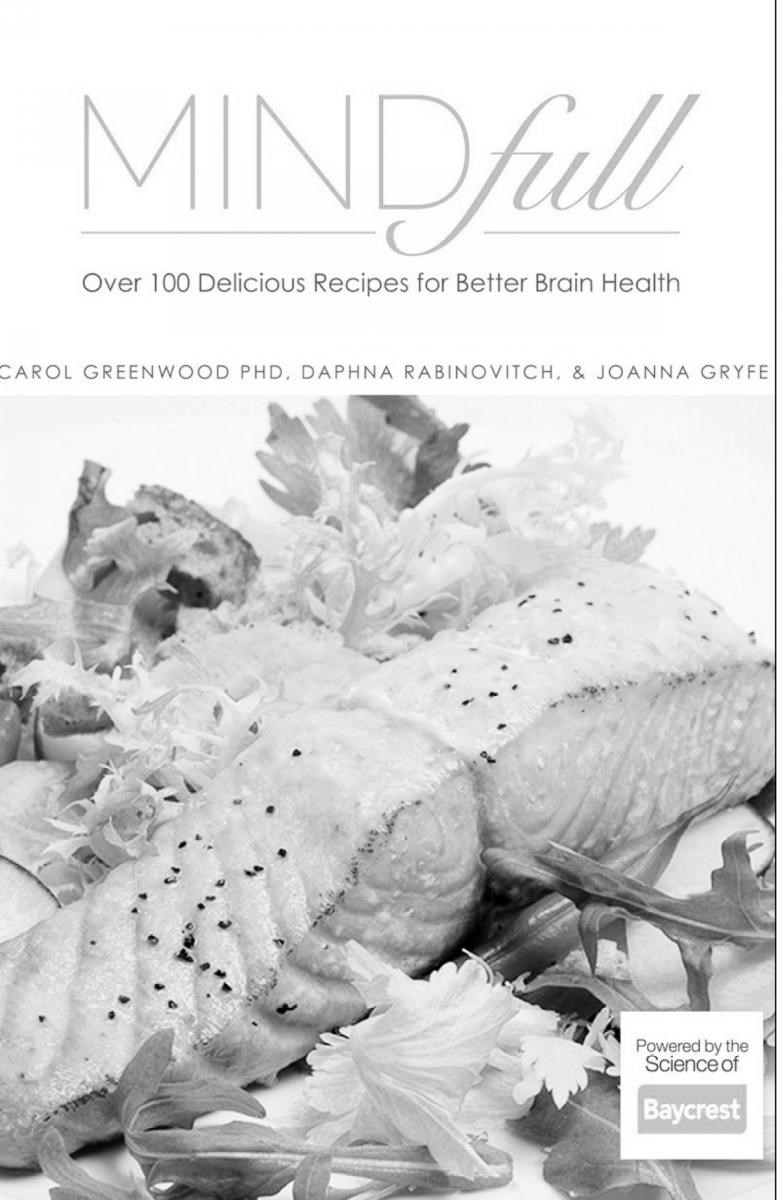A team of experts has cooked up a new book that interweaves scientific facts about brain health with some tips on lifestyle choices in an effort to reduce users' likelihood of developing dementia.
The e-book, called Mindfull, was inspired by a belief that scientific information about brain health hasn't been presented in a way that people can incorporate into their daily lives, said coauthor Carol Greenwood, a scientist and professor of nutrition and brain health.
Greenwood is with the Rotman Research Institute at Baycrest Health Sciences and the University of Toronto.
She collaborated with Daphna Rabinovitch, a recipe developer and food writer, and Joanna Gryfe, a food and media expert, to compile the 300-page book of consumer-friendly information on the science of nutrition and brain health, along with 100 recipes supporting those principles.
"It's a resource that you can use in terms of understanding what we know about brain health both from a diet [and] from a lifestyles perspective," Greenwood said in a phone interview.
"Developing a resource that would combine the scientific background and then how to transition that into your diet and then using recipes as a scaffold to do that was kind of where this all came together."
Experts predict dementia rates will soar in the coming decades as Canada's population gets older.
According to the Alzheimer Society of Canada, 60 per cent of Alzheimer's diagnoses are attributed to lifestyle choices. Poor eating habits and a lack of physical and intellectual stimulation are stronger drivers for dementia than genetics alone.
"Effectively what we've tried to produce was a whole-brain health resource," said Greenwood, who has been exploring the relationship between diet and brain health for close to 30 years.
"We're trying to stay away from arguing there's a magic bullet [to prevent dementia], because I don't believe there is, but talk broadly in terms of giving people optimism that knowing the more that they tend to their lifestyle that they can look forward, perhaps, to having a healthier cognitive retirement."
Skeptics may question whether varying one's food intake can protect against dementia. Greenwood said people may not realize that other health conditions associated with diet also influence brain health.
"The glass-half-empty part of it is that everyone will acknowledge that elevated cholesterol and blood pressure and Type 2 diabetes are diet-related disorders, but I think what they don't recognize is that those are risk factors for cognitive decline and dementia," she explained.
"So if you don't eat well for what I [call] south of the neck, then it's going to compromise north of the neck."
The glass half-full part, she said, is the fact that there is an increasing body of evidence from long-term studies that suggest certain behaviours are associated with retaining cognitive function during aging, "and within that context there's been a lot of exploration about diet."
To give the book a coast-to-coast flavour, the authors asked well-known chefs such as Michael Smith, Mark McEwan and Dale Mackay to contribute recipes.
As well, Laureen Harper - wife of Prime Minister Stephen Harper - agreed to provide a recipe they've called Parliament Hill Smoothie. The yogurt-based drink with fruit in the book's breakfast section is one that she, the prime minister and their children often have.
There is information about the need to control body weight. "A lot of obesity-related disorders are associated with cognitive decline and dementia risk," Greenwood said.
The authors tried to focus on a variety of healthful foods, such as fruits, vegetables, whole grains, nuts and fish, she added.
The book lists many spices and herbs.
Turmeric has long been touted for its curcumin, which is said to help memory. People are also identifying others that have antioxidant properties such as sage, oregano, black pepper and coriander.
Greenwood said that doesn't mean people ought to start munching on herbs. But "if you are using them in a way that's helping you consume other fruits and vegetables ... it's another way to increase your exposure to that breadth of healthful compounds in plant-based foods."
Sprinkled through the book are myths surrounding brain health.
"I'm old enough that I grew up in an era where we were being taught that after brain development, after adolescence, that really the brain was this self-protected organ and we didn't need to know about it and that has really collapsed in our understanding in the last 15 to 20 years," she said.
"We now know that the brain can make new nerve cells, it can make new brain connections, that it is sensitive in terms of variation, in terms of nutrient intake.
"So while our brain doesn't grow larger, we do continue to renew and refresh and that it's really making certain that we provide the right environment for renewing and refreshing that's going to be so important for retaining your cognitive function."
The e-cookbook is available as a $9.99 download from e-book retailers iTunes, Amazon, Kobo and coming soon on Google Play. Proceeds from the sale of Mind-full will support Baycrest programs and services that promote excellence and innovations in aging and brain health.



